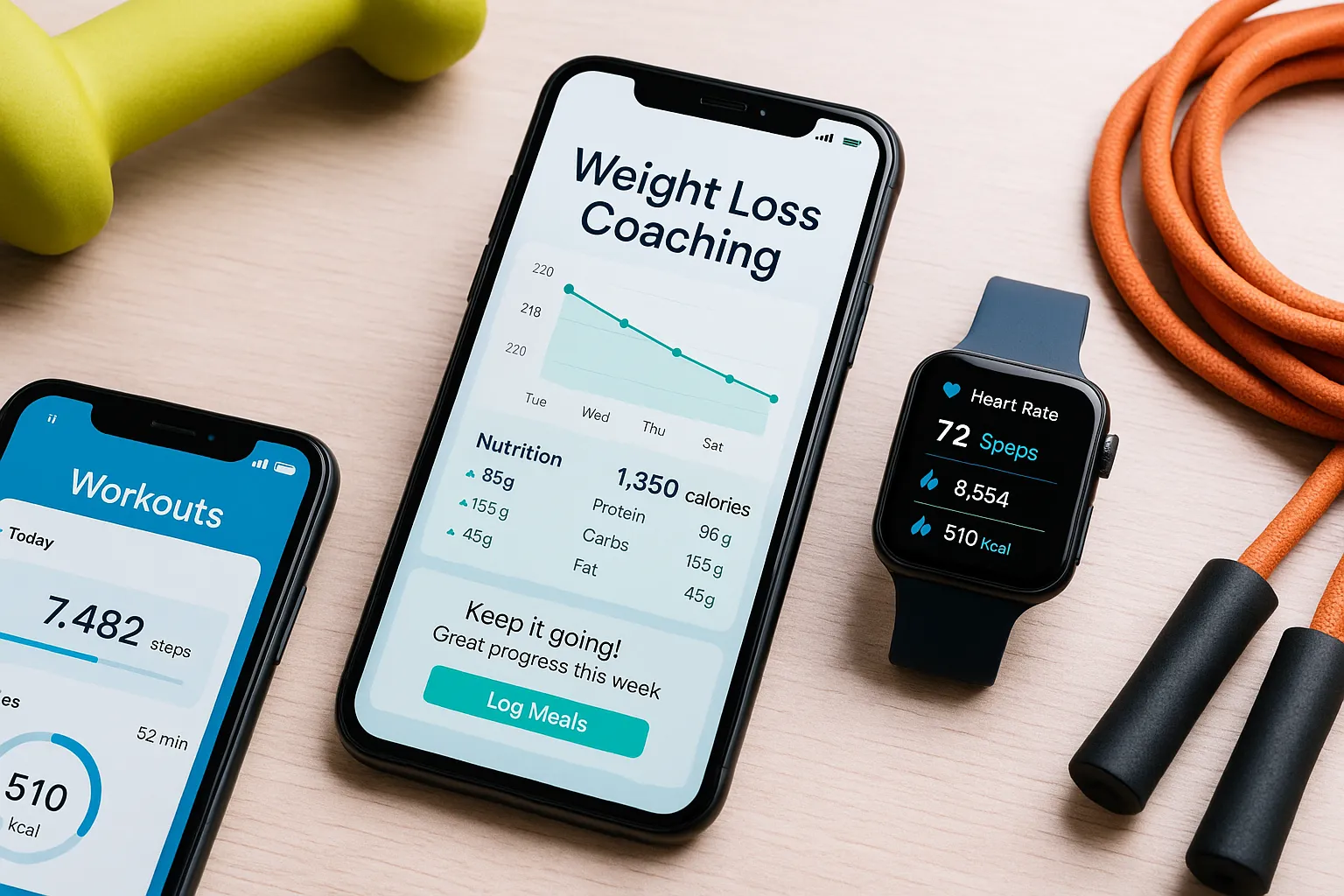The digital wellness industry isn’t just having a moment—it’s setting the tone for the next decade. And leading this transformation is behavior-focused, app-based coaching like what Noom offers. Built on psychology, habit tracking, and personalized guidance, Noom has sparked a new category of health-tech apps that don’t just count calories—they reshape lifestyles. As more users look for accountability and smart nudges rather than crash diets or intimidating gym routines, Noom clones have become a prime opportunity for startups and health entrepreneurs. If you’re planning to build a Noom-like app in 2025, the big question is: which clone script gives you the right mix of functionality, scalability, and pricing? That’s exactly what we’re breaking down today.
What Makes Noom Clone Scripts So Popular in 2025?
The pandemic-era health boom showed us something valuable—people are willing to invest in sustainable health guidance. Noom cracked the code by combining behavior science, mobile coaching, and content gamification. But here’s the twist: not everyone wants the same food pyramid or fitness journey. That’s why niche-focused Noom clones—for PCOS, athletes, diabetes, vegan lifestyles, or even stress management—are emerging fast. A good Noom clone script allows you to plug into that demand quickly. It gives you a ready-to-launch health coaching platform with built-in tools like journaling, chat-based coaching, AI nudges, goal tracking, and more. In 2025, these scripts are helping entrepreneurs bypass the tech headache and focus on growth, branding, and customer outcomes.
Read More : What is Noom App and How Does It Work?
Key Features to Look For in a Noom Clone Script
Before you pick a script, make sure it’s not just a calorie counter in disguise. A true Noom clone replicates the psychology-first approach to weight loss and wellness. Here are the must-have features you should expect in a 2025-ready solution:
1. Personalized Health Plans
- AI-generated meal and activity plans based on user goals and lifestyle
- Adaptive goals that update as user behavior changes
- Habit stacking and micro-task recommendations
2. In-App Coaching
- 1-on-1 chat or group coaching interfaces
- Integration with certified health professionals
- Coach dashboards for managing user progress
3. Behavioral Tracking
- Mood journals, food logs, and stress logs
- Streak systems to encourage consistency
- Push-based habit reminders and nudges
4. Psychological Content Modules
- CBT-based lessons for behavior change
- Daily short reads and quizzes
- Interactive progress maps
5. Gamification & Community
- Achievement badges
- Leaderboards for challenges
- Group forums and comment threads
6. Admin Panel & Analytics
- Engagement and retention analytics
- Coach performance insights
- User segmentation and funnel tracking
Pricing Comparison: Top Noom Clone Scripts in 2025

Let’s cut to the chase—pricing matters. Whether you’re a bootstrapped solopreneur or a healthtech startup backed by investors, knowing what you’re getting for your money can be a deal-breaker. Here’s a comparative overview of the top Noom clone solutions available in 2025:
1. HealthTrackPro
- Pros: Strong UI/UX, HIPAA-compliant, built-in video call module
- Cons: Lacks multilingual support out-of-the-box
2. NutriCoach X
- Pros: Includes AI meal planner, integrated wearable sync
- Cons: Coach assignment system feels outdated
3. WellnessMind Clone
- Pros: Budget-friendly, ready-to-launch MVP
- Cons: No built-in community features
4. PsychFit 360
- Pros: Fully managed cloud solution, custom content engine
- Cons: No code access, white-label only after 6-month lock-in
5. FitBehavior Script by DevLabs
- Pros: Built for scalability, customizable AI coaching engine
- Cons: Longer deployment timeline, developer-dependent
Choosing the Right Noom Clone Script for Your Business Model
Not every clone fits every use case. Choosing the best Noom alternative depends on your end goals, audience, and monetization approach. Here’s how to match the right script to your vision:
- For Coaches & Nutritionists: Go for a script with built-in chat and video, easy onboarding, and admin tools. HealthTrackPro or NutriCoach X may suit well
- For MVP Launches: If speed matters more than scalability, WellnessMind Clone helps you go live fast and iterate
- For Scalable Startups: Want venture scale? FitBehavior Script offers modularity and long-term customizations
- For Subscription Models: PsychFit 360 gives you a SaaS model that’s easy to manage, though pricier over time
Read MOre : Top 10 Ideas for Healthcare Staffing Business Startups in 2025
Cost Factors & Pricing Breakdown
Noom-Style Weight Loss Coaching & Wellness Platform — Market Price
| Development Level | Inclusions | Estimated Market Price (USD) |
|---|---|---|
| 1. Health & Nutrition MVP | User onboarding, progress tracking, calorie logging, goal schedules, basic dashboards, notifications | $35,000 |
| 2. Full Behavioural Science Wellness System | AI recommendations, workout programs, habit coaching, chat-based guidance, integrations (steps, wearables), analytics & reports | $75,000 |
| 3. Enterprise Digital Health Coaching Suite | Video coaching, telehealth integration, subscription billing, team-based coaching, medical compliance, advanced analytics | $150,000+ |
Miracuves Pricing for a Noom-Like Platform
Miracuves Price: Starts at $14,999
Miracuves delivers a performance-driven digital wellness and weight management platform designed for rapid deployment — supporting personalized habit transformation workflows, food & activity tracking, coaching tools, subscription plans, and scalable engagement dashboards.
Note
This includes full non-encrypted source code, complete deployment support, backend/API setup, admin panel configuration, and publishing assistance for Android & iOS — ensuring a fully operational platform ready for launch and future expansion.
Build Your Noom-Style Health & Coaching Platform Faster While Others Spend $75,000+ and Wait Months — Contact Us Today
Delivery Timeline for a Noom-Like Platform with Miracuves
30–90 Days, depending on:
- AI personalization & coaching workflows
- Nutrition & wearable integrations
- Subscription billing models
- UI/UX complexity
Tech Stack
We will be using JavaScript for the full platform architecture (Node/Next.js, PostgreSQL) & Flutter for mobile apps, optimized for secure health data processing, scalability & multi-role operations. Custom stack variations available if required.
Real-World Use Cases: Where Noom Clone Scripts Are Winning
The magic of clone scripts is that they can be adapted across verticals. In 2025, we’re seeing creative twists on Noom clones:
- Corporate Wellness Platforms offering coaching to employees
- PCOS-Focused Apps with lifestyle tracking for hormonal health
- Diabetes Prevention Programs that blend content with live tracking
- Postpartum Health Apps helping new moms ease back into fitness
- Mental Health Coaching Apps merging CBT, journaling, and mood metrics
Each of these starts with a Noom-like base—but evolves into something more personalized, more focused, and ultimately, more engaging.
Monetization Models Supported by Noom Clone Scripts
The best scripts in 2025 support flexible revenue channels. Depending on your audience and business model, you can mix and match:
- Monthly Subscriptions: Classic SaaS style for users or companies
- In-App Purchases: Unlock extra features, premium coaching, or challenges
- Freemium Model: Free core, pay for depth
- Coach Marketplace: Charge commissions on coaching sessions
- Corporate Packages: Bulk licensing to organizations or hospitals
Final Thoughts
The wellness industry isn’t just going digital—it’s becoming deeply personal. People aren’t looking for another calorie tracker. They want a coach that fits in their pocket, understands their habits, and adapts to their lifestyle. Noom may have set the benchmark, but there’s still massive room for fresh ideas and smarter solutions. Whether you’re aiming to launch a niche fitness app, a medically-informed coaching platform, or a scalable wellness solution, the right Noom clone script can get you moving faster—without starting from scratch. In 2025, the platforms that win won’t be the flashiest. They’ll be the ones that deliver real impact—measurable results powered by empathy, smart data, and intentional design. Ready to launch yours? Let’s make it happen.
FAQs About Noom Clone Scripts
What is a Noom clone script?
A Noom clone script is a pre-built health coaching software that mimics the core features of Noom—like behavior tracking, coaching, nutrition plans, and habit change tools—while allowing customization and branding flexibility.
Can I launch a Noom clone app without coding skills?
Yes, most modern Noom clone scripts come with full admin panels and turnkey deployment options. You don’t need to code, but you should partner with a development team or platform that handles setup, hosting, and branding.
How can I monetize a Noom-like app?
Popular monetization models include monthly subscriptions, pay-per-feature unlocks, premium content access, and commission from health coaches. You can also license the app to organizations as a corporate wellness platform.
Is it possible to include video coaching in a Noom clone?
Absolutely. Many clone scripts now support video chat integration, enabling one-on-one or group coaching features. Look for platforms that support Zoom, WebRTC, or native video call SDKs.
How long does it take to launch a Noom clone?
If you’re using a ready-made script with minimal changes, you could go live in 2–4 weeks. Customizations and feature enhancements could extend the timeline to 6–10 weeks depending on scope.
Is it safe to store user health data on a Noom clone platform?
Yes, but you must follow data privacy regulations such as HIPAA (in the U.S.) or GDPR (in Europe). Choose scripts that offer encryption, secure login systems, and role-based access control.
Related Articles








